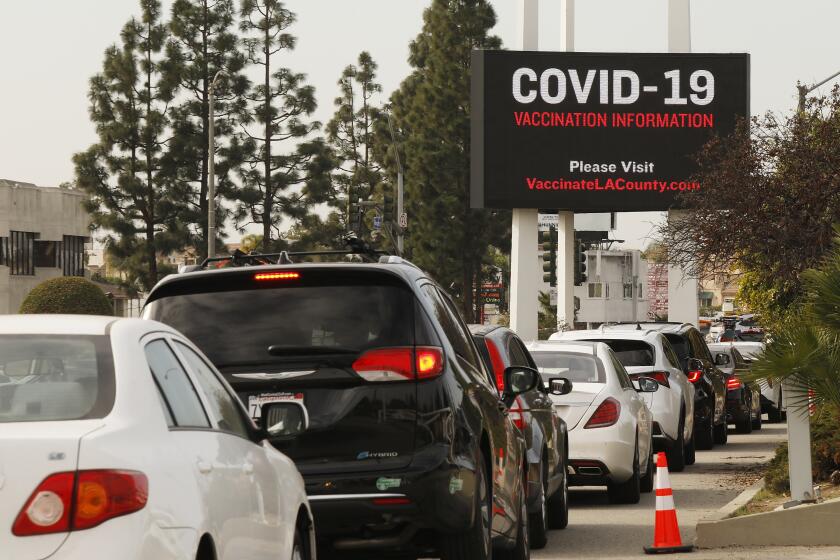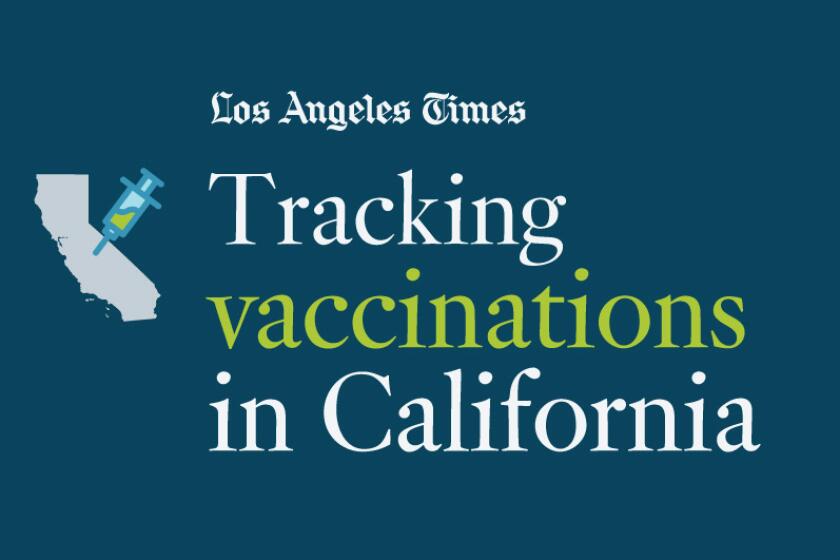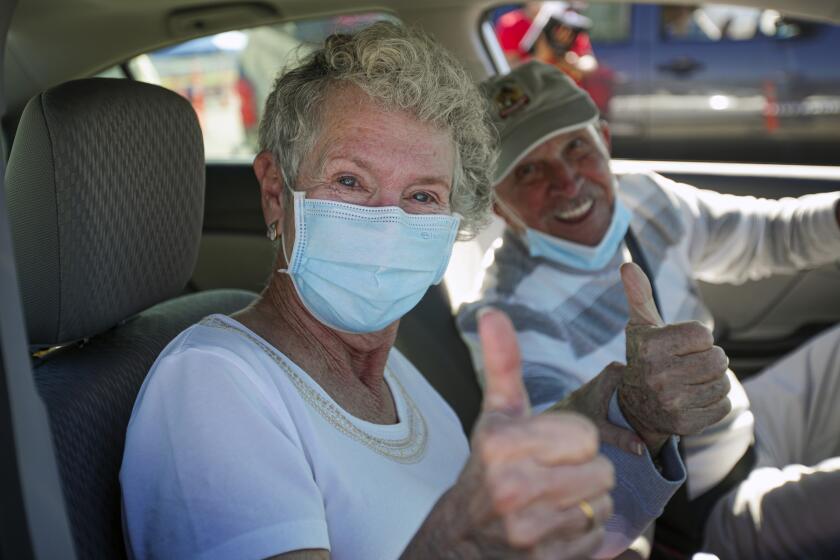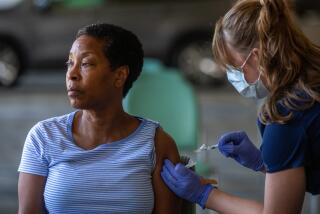How to get a COVID-19 vaccine in Orange County
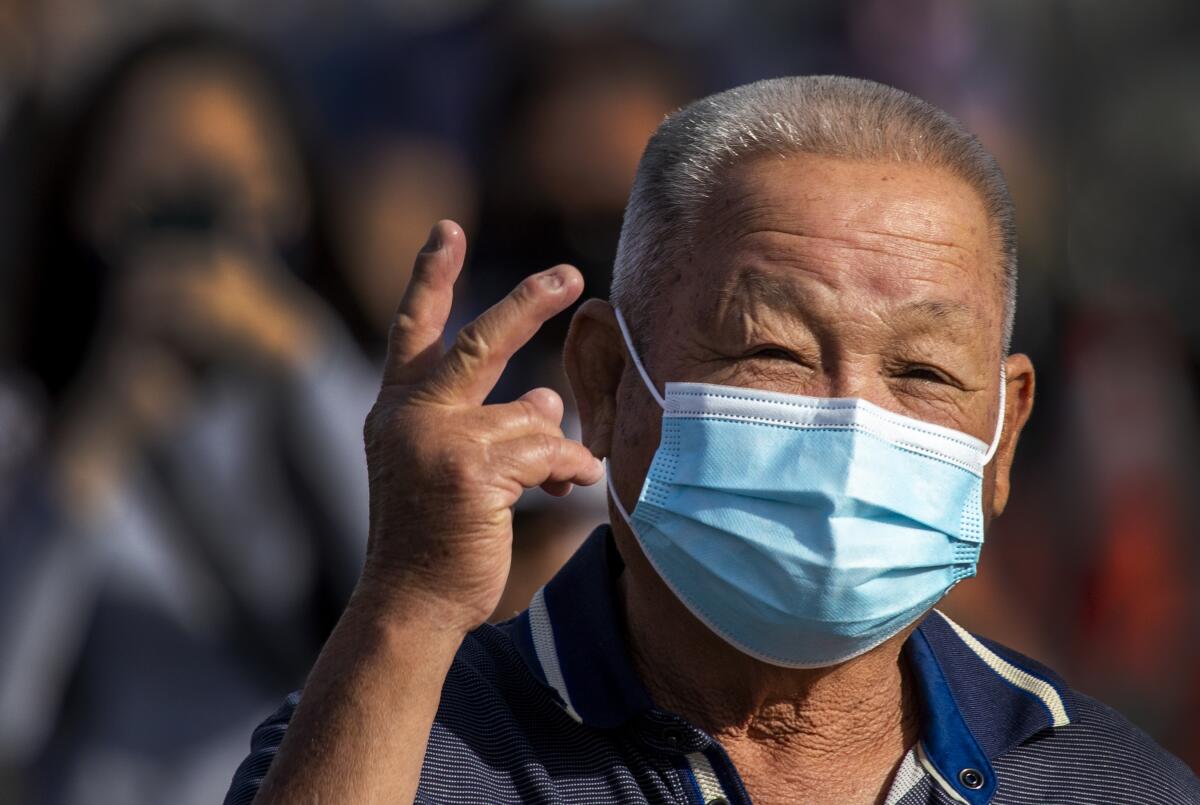
- Share via
Vaccine sites specifically for teachers, drive-through options for disabled people and an appointment site that’s now available in Spanish, Vietnamese and Korean — these are just some of the recent updates to the Orange County’s COVID-19 vaccination effort.
It was a challenging start, but as of March 4, almost 480,000 people have gotten at least one vaccine dose in Orange County, and almost 255,000 have received both doses.
In a county with more than 3.1 million residents — and an estimated 450,000 seniors and 477,000 people who work in education, childcare, food and agriculture or emergency services — there’s still a long way to go.
California officials announced that by mid-April, all adults should be able to get the COVID-19 vaccine.
Orange County is currently vaccinating residents and those who work in the county in phases 1A and 1B — which include critical and healthcare workers; residents of long-term care facilities; people 65 and older; educators; food service, grocery and agriculture workers; childcare providers and emergency services — as well as those ages 16-64 with underlying medical conditions.
As outlined by the state, eligible conditions include:
- Cancer, current with debilitated or immunocompromised state.
- Chronic kidney disease, stage 4 or above.
- Chronic pulmonary disease, oxygen dependent.
- Down syndrome.
- Weakened immune system from solid organ transplant.
- Pregnancy.
- Sickle cell disease.
- Heart conditions, such as heart failure, coronary artery disease, or cardiomyopathies (excludes hypertension).
- Severe obesity (Body Mass Index ≥ 40 kg/m2).
- Type 2 diabetes mellitus with hemoglobin A1C level greater than 7.5%.
On April 1, residents who are at least 50 years old can get vaccines, and all Californians will be eligible by April 15.
Here’s what you need to know about getting your vaccine in Orange County. If you’re elsewhere in Southern California, here are our guides for other counties. This is the most updated information we have, and it is subject to change.
The process for getting a COVID-19 vaccine varies county to county.
Where things stand
Before, if you weren’t a healthcare worker or in a nursing home, your best bet for getting vaccinated was to go through the county’s Othena app.
Now, there are many more options, Chau said, and people should just try to get vaccinated wherever they can find an appointment.
If you are eligible because of the industry you work in, follow your employer’s directions. You may be able to get vaccinated at your workplace or at a specialized site.
For example, as of March 1, pre-K through Grade 12 educators and school staffers can get their vaccine through a site operated by the Orange County Department of Education in partnership with local school districts. You’ll still have to sign up for the county’s Othena.com system. Follow the instructions for educators on the department’s website.
You can also try local pharmacies. Through a partnership with the federal government, CVS and Walgreens are offering COVID-19 vaccines in select locations in California. Check cvs.com or call (800) 746-7287 to make appointments at an O.C. location; Walgreens’ supply for Orange County — go to walgreens.com/ScheduleVaccine or call (800) Walgreens — is more limited. Other pharmacies may also have doses as well.
Hospitals, medical centers and community health clinics are also making appointments. Check their websites for updated information.
Here’s how to get your vaccine appointment through a county-run site.
Sign up for an Othena account
Go to Othena.com or download the Othena app.
Spanish-, Vietnamese-, and Korean-language versions of the website are available. To change the language, click on “English” at the top of the page and select your preferred language. A Chinese-language version is in the works; in the meantime, there are Chinese (simplified) instructions on how to navigate the site.
If you need technical help with Othena registration, call (714) 834-2000.
You’ll be prompted to fill out a COVID-19 vaccination pre-screening questionnaire, where you certify that you live or work in Orange County, whether you’re over 65 or work in an industry that makes you eligible for the vaccine and if you have one of the state’s determined underlying health conditions.
If you qualify and there are appointments available, you will be able to make an appointment. But more likely, you’ll be asked to register (with a unique email address, password, name, date of birth, sex at birth, race, ethnicity, occupation and employer) and be put in a digital waiting room.
You’ll be asked about insurance, but you don’t need insurance to get a shot. It’s free.
Watch out for scams: The Othena app will never ask you for your Social Security number, credit card information, bank information, or any payment information, nor will there ever be any phone calls directly to you. You also won’t be asked about your immigration status.

An instructional video shows how to use Othena, which is a vaccine-scheduling platform used by Orange County.
How the digital waiting room works
Appointments are prioritized based on eligibility, time of registration and vaccine supply.
You should get an email when it’s your turn to make an appointment, but it’s best to be diligent about checking your Othena account.
Once it’s your turn, you have a four-hour window to make an appointment. If you don’t make an appointment within four hours, Othena will open the slot to someone else, the county said. If you miss three windows, you’ll be removed from the queue.
If you need to cancel an appointment, you can do so through Othena. Now that there are more vaccination options outside of the county-run sites, Othena is sending weekly emails where registrants can indicate that they have received a vaccine elsewhere or are not interested in receiving a vaccine.
Schedule your appointment
Once your appointment window opens, you can choose a vaccination time and a location. There are four county-run sites: Disneyland, Soka University, Santa Ana College and the Anaheim Convention Center.
The Disneyland site is in the park’s Toy Story parking lot at the southeast corner of Katella Avenue and Harbor Boulevard. It was the first large vaccination supersite to open in January, and on March 8, the county transformed it into its first drive-thru site, accommodating people with disability placards and licenses. It primarily administers the Moderna vaccine.
The Soka site is inside a gymnasium, and they primarily carry the Pfizer vaccine. There’s also a vaccine drive-through lane for appointment holders with disabilities who are displaying vehicle placards or license plates.
The Anaheim Convention Center vaccination site is inside Hall A. It primarily carries Moderna.
The Santa Ana College site is indoors and outdoors, with walk-up and drive-through options. It primarily carries Pfizer.
“We established the Santa Ana College POD to vaccinate eligible residents in the hardest-hit and underserved communities in targeted ZIP Codes within Santa Ana, Garden Grove, and Anaheim,” said Jessica Good, the county’s public information manager. “Beginning March 8, individuals eligible under Phase 1B can also schedule appointments at the Santa Ana College POD through Othena.”
The Orange County Department of Education’s school employee vaccination sites primarily carry Johnson & Johnson, previously Moderna.
As the vaccine allocations and variety increase, individuals will be able to choose which vaccine they want to get based on what is available at the site.
What to take to your appointment
Residents 65 and over need to show photo ID and proof of residency.
Phase 1A and 1B, Tier 1 workers need to show photo ID and one of the following:
- Professional license.
- Employee badge with name.
- Signed letter from employer on facility letterhead.
- Employment paystub with printed name.
- School employees with an appointment at the Department of Education site should bring a state ID, as well as a current paystub or a bank statement showing a recent direct deposit.
- Those with underlying health conditions do not need to bring extra documentation; they will need to “self attest” that they have one of the identified conditions when scheduling an appointment through Othena.
Those who booked the appointment through the app can show the code that can be scanned on-site. Others can be confirmed through their name, birthday and appointment ID number.
Check the weather report, and dress accordingly if you’re going to an outdoor site. Appointments have been canceled and rescheduled due to weather.
Get your second dose
Anyone who received a first dose through the Othena system will receive an appointment within the appropriate second-dose time frame. Othena also tracks the type of vaccine you got, so you get the same one for the second.
The second dose for Pfizer should be administered after 21 days, while the second dose for Moderna should be scheduled after 28 days. But don’t worry if you don’t get the second dose exactly on time. The CDC says it may be administered up to six weeks (42 days) after the first dose.
You should seek your second dose from the same system you got your first dose, whether it was Othena or through your employer or healthcare system.
If you get the newly authorized Johnson & Johnson vaccine, don’t worry about a second dose. It’s a single shot.
Experts say about most Americans will need to be vaccinated to bring the coronavirus pandemic under control. Track California’s progress toward that goal.
What about health equity?
Latino Health Access and the OC API Task Force target underserved communities in the county and host pop-up mobile clinics in locations such as Christ Cathedral for vulnerable seniors in critically underserved communities. These often include populations that don’t speak English, don’t have computers and internet access, lack transportation or do not have legal status.
The Orange County Transportation Authority and the Westminster community organization Abrazar are working to help provide transportation for vaccine seekers who need it.
“This outreach effort isn’t intended for the general public, who typically have resources that many communities of color and lower income do not have available to them,” Good said. “We are working in collaboration with community partners to support these grass-roots efforts to reach seniors close to home and offer more vaccination options for this vulnerable population.”
Still confused?
Follow the Orange County Health Care Agency on Twitter (@ochealth) or Facebook for daily updates.
For example, the county recently explained that the Disneyland site would close March 4 to be reconfigured to accommodate people with disabilities and allow for in-car vaccinations starting March 8. Depending on supply, the county may announce a halt to vaccination appointment for first doses to concentrate on second doses. Weather-related closures can also be announced on social media.
Know that it can still be a long wait to get an appointment, but once you get one, many people have reported being able to get in and out within an hour, including the 15- to 30-minute observation period to make sure you don’t have any allergic reactions, which are rare.
More information is available at the Orange County Health Care Agency website, including a vaccination distribution plan chart that outlines eligibility so you can see when you might be able to get vaccinated.
Sign up for the county’s COVID-19 newsletter.
For individual questions, call the county’s COVID-19 hotline: (714) 834-2000. Live operators are available Monday to Friday, 8:30 a.m. to 5 p.m., and Saturday and Sunday, 8:30 a.m. to 3 p.m.
Email Othena at [email protected] or the Orange County Health Care Agency’s Immunization Assistance Program (IAP): [email protected].
Small, maskless gatherings among people who have been fully vaccinated against COVID-19 could soon be allowed under federal guidance.
More to Read
Get the Latinx Files newsletter
Stories that capture the multitudes within the American Latinx community.
You may occasionally receive promotional content from the Los Angeles Times.
